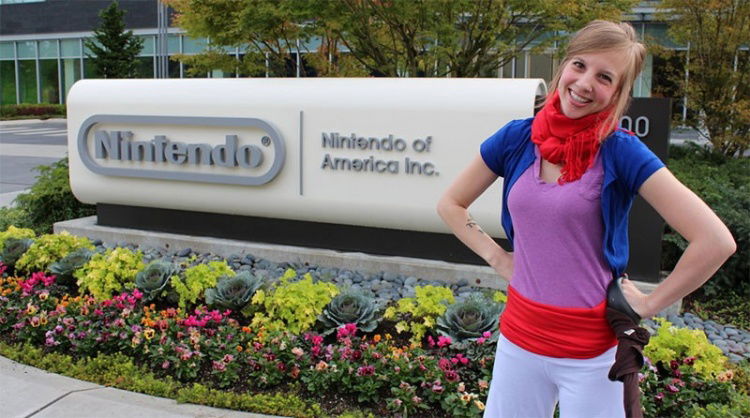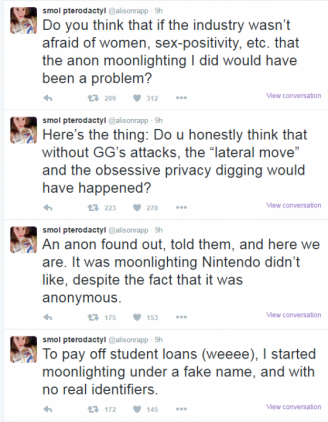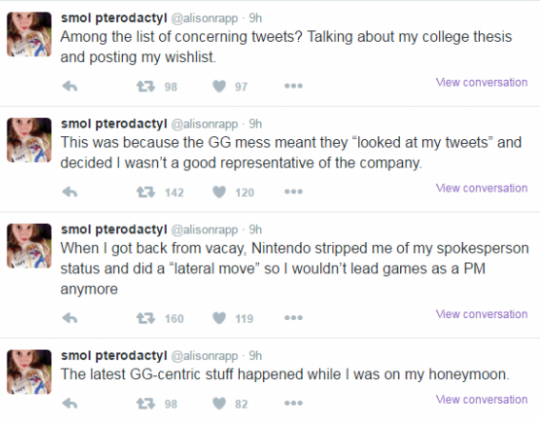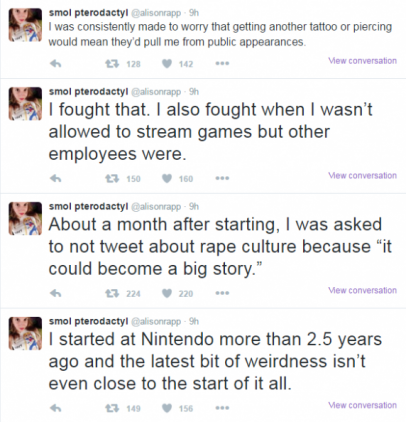Nintendo and Alison Rapp parted ways Wednesday evening, in what can be said to be a less than amicable split.
However, let’s not pretend that it was solely about the backlash that came from her online harassment. While it may be considered a driving factor (it’s not, based on what we know from both sides,) let’s not ignore the alleged story behind why Alison Rapp was let go by Nintendo of America.
Rapp, a 2 year employee of Nintendo of America, under her own admission, was moonlighting under a psuedonym to pay off student loans, and the job wasn’t necessarily up to snuff with her employer’s company ethos. This should have been the end of the discussion. It wasn’t, unfortunately.
Before Nintendo was able to get a statement out, if it was their intention to issue a statement, Rapp forced their hand by going on her Twitter account and issuing a statement about her release as a series of tweets (shown in reverse order:)
As soon as this was posted up, Patrick Klepek of Kotaku and several other media members instantly jumped on the story, essentially calling out Nintendo for not issuing a statement, essentially forcing Nintendo’s hand. In a statement issued to IGN later that day, Nintendo had the following to say:
Alison Rapp was terminated due to violation of an internal company policy involving holding a second job in conflict with Nintendo’s corporate culture. Though Ms. Rapp’s termination follows her being the subject of criticism from certain groups via social media several weeks ago, the two are absolutely not related. Nintendo is a company committed to fostering inclusion and diversity in both our company and the broader video game industry and we firmly reject the harassment of individuals based on gender, race or personal beliefs. We wish Ms. Rapp well in her future endeavors.

Nintendo gave her the ol’ WWE Future Endeavor, and Nintendo made it absolutely clear in this press release that the issues that Alison was facing was not related to her termination from the House of Mario. However, that didn’t stop a stream of developers and game industry insiders from attacking Nintendo or tweeting in her defense, despite the lack of information that was present:
So @NintendoAmerica just fired someone because GG didn’t like her. We had a game planned for Wii U. Not now we don’t https://t.co/x5363cgBnF
— brandon sheffield (@necrosofty) March 30, 2016
Hate mobs thrive on the cowardice of game companies. We ARE the community we create. And @NintendoAmerica just made our community worse. -JP
— Extra Credits Team (@ExtraCreditz) March 31, 2016
When companies cave in to vile harassment tactics aimed at women, they send a message that those tactics of gendered abuse are acceptable.
— Feminist Frequency (@femfreq) March 30, 2016
However, not everyone felt this way, as people like Notch had the following to say:
@Transflux I actually share this opinion. The views discussed here disgusts me, and I understand why that can lead to getting fired though.
— Markus Persson (@notch) March 30, 2016
Honestly, I do feel bad for Alison. While a lot of the outrage towards her was deserved (and others undeserved,) my biggest beef with her is her lack of professionalism, and blatant disregard for Nintendo’s directives towards her as a representative of their brand. She paid the price for her insubordination, in what might have been the most lenient way possible, a lateral move within the department she was in, where she was now out of a public relations position, by her own admission. Again, that should have been the end of it, and alas, it wasn’t.
Was it sheer stupidity that caught up with Mrs. Rapp? Possibly, no, definitely. Moonlighting as a risque model, and posting it on her active twitter account, where the world has access to it, and not expecting Nintendo to find out is insanity to me. Especially since she was an active public relations liaison for Nintendo, the most family friendly gaming company this side of Disney. Did that shut her up, or prevent her from doing what she did to get fired? Absolutely not.
But the most dangerous part about this, isn’t the idea of Alison Rapp playing the victim complex immediately after her termination. It’s people like Patrick Klepek of Kotaku jumping the gun and reporting on this story without all of the facts. It is also the idea that other news outlets ignoring the idea that she was terminated because of the revelation of her second job outside of Nintendo, even after Nintendo themselves issued the statement to IGN. It seemed like…I don’t know…manufactured outrage.
This is the issue that comes to play now. Manufactured outrage by the members of the gaming journalism media that I was and still am proud to call myself a member of. The bush league Pulitzer-level yellow journalism (don’t get it mistaken, Pulitzer was the worst thing to happen to news media in his day with the advent of sensationalism,) that has been rampant in the gaming press is what’s fueling the latest outrage against Nintendo for “not protecting” their employee when she was initially harassed, as well as for her, what I view as rightful, termination from the company.
The facts remain, via Alison’s own admission, that she was doing something wrong while working for that company, or else she wouldn’t have had to use a psuedonym for her second job, while still posting risque photos on her personal Twitter account. The fact that she was, by her own admission, fighting and defying Nintendo’s wishes for her to stop talking about rape culture, or the fact that she wasn’t allowed to stream Nintendo games, due to Nintendo’s stringent streaming policies. I’ve stated this before, Alison Rapp became not only Nintendo’s nightmare, but her own personal nightmare, both professionally and personally.
And while she was harassed, and some people believe that Nintendo should have stepped in during the episode, I respectfully disagree, considering that she had been warned, on several occasions that her opinion could potentially be damaging to not only herself, but to Nintendo’s corporate image. Also, it did no favors that instead of just issuing a simple statement of “I had nothing to do with the localization of Fire Emblem,” and ending the discourse there, she got overly defensive about the whole thing, adding fuel to the fire. Both sides were definitely in the wrong, but in a professional aspect, it continued compounding onto Rapp’s current issues within the company and without.
If you are reading this, and you believe that I am condoning the actions of a few miserable people on the internet, rest assured, I am not. I am, albeit controversially, condemning not only Mrs. Rapp, but also people like Mr. Klepek from Kotaku, Brianna Wu and the all-around queen of informational cherry-picking, Feminist Frequency’s Anita Sarkeesian, for pushing a knowingly false and damaging narrative, which leads to the mainstream media, CNN, Fox News, MSNBC and the like attaching themselves to this narrative, and further damaging the image of gaming that we have tried to revitalize for so many years. If you consider yourselves a gaming journalism outfit, or member of the games press, and you do bush-league level reporting and editorials like many have done over the last few years, you’re no better than a blogger begging for clicks.
Nonetheless, Alison Rapp has officially suffered terrible, but not life threatening, wounds to her professional career with these revelations coming to light. The most worrying thing? She could have avoided all of this had she done what any public relations employee should know how to do. She simply didn’t pick her battles carefully enough, and committed to doing knowingly shady acts. As a result, she paid the price for her idiocy. And believe me, Nintendo shouldn’t have to take misguided vitriol for this. Nintendo had nothing to do with this, and by Rapp’s own admission, Nintendo did everything right by trying to keep her in check. She just chose to play with fire, and got burned. End of story.





